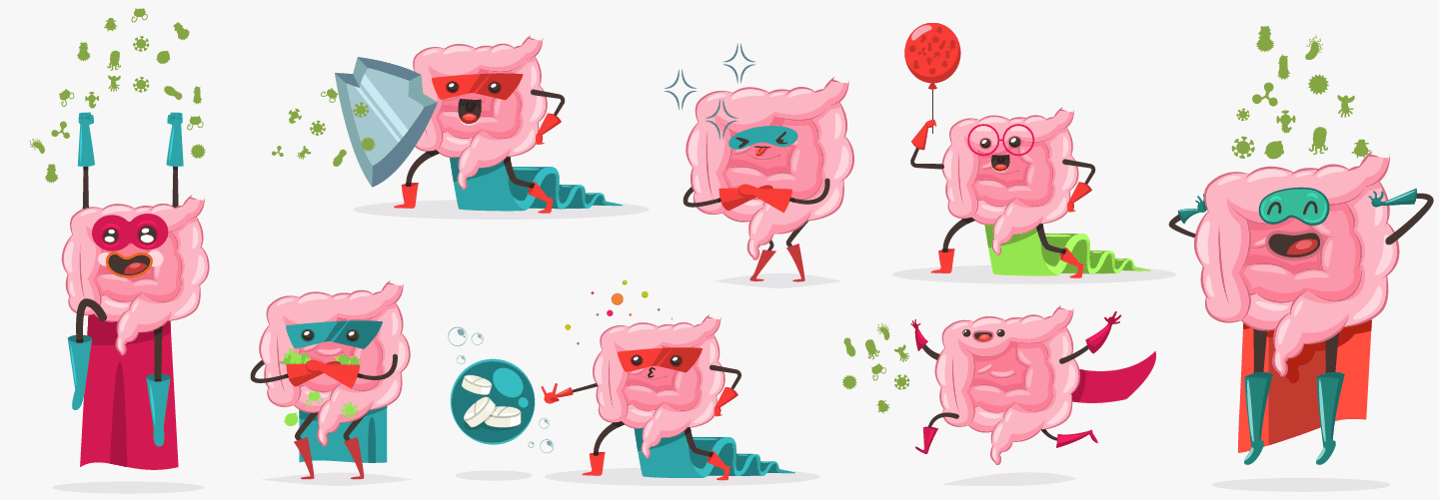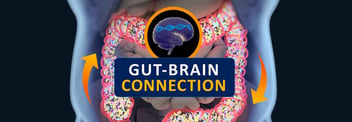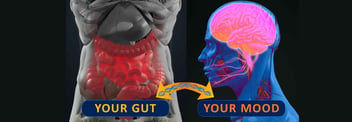Your Mighty Moody Microbiome – Part 4 Ninety Trillion Bugs Cry Out, “Feed Me. Feed Me.” Why Should You Care?
- Home
- Blog

Reader, in the spirit of the new school year, I want you to close your eyes and travel back to yesteryear to picture the first day of class. You’re running late, and as you enter the classroom, there’s one desk left. Your lucky day! As you sit down and place your notebook on the desktop, you detect it—the dreaded wobble. Peering shyly underneath the desk, you determine one of the legs seems to be missing a screw connecting it to the desk itself. Then, you hear the teacher announce the desk you claimed will be your assigned seat for the whole semester. As you shift uncomfortably in your chair, you begin to worry: if this desk leg wobbles at just the wrong moment, the entire thing will topple. You have three options in front of you: You can ignore it; you can place a piece of duct tape over it to try to secure the leg to the desk to the desk itself; or, you can get the help of a janitor to invert the desk, to fully “diagnose” the issue at hand and repair it correctly. Only one of these options, of course, guarantees you a complete repair. Ignoring it will inevitably leave you with a sense of continued insecurity: will this be the day the desk leg gives out and embarrasses me? Taping it will do the same: how long can this little piece of tape hold? We not infrequently use “band-aids” to treat the “broken bones” in our lives. But if we don’t fully repair the fractures- taking into consideration all of their various components and how they work together—we never feel as good as possible. And what value would you place on achieving peace-of-mind?
Within this simple, straightforward thought exercise lies a profound message: the medical world is beginning to see the body itself not as a series of disparate elements—the desk and its legs, so to speak—but as a holistic, dynamic instrument, with elements that coincide, intermingle, and greatly inform one another. In the world of mental health, it is no longer enough to isolate the workings of the brain as the primary receptor for treatment. Revolutionary research is finding that our gut microbiome plays a significant role in both driving mental illness, and also in creating a feedback loop that can perpetuate that illness—and sometimes make it worse. As I have noted in prior blogs, our 32 trillion human cells are deeply influenced by, and interconnected with, on a moment-to-moment basis, the 90 trillion “bugs” that comprise our microbiome. This week, we will continue our series on the Mighty Moody Microbiome by discussing the Gut-Brain Connection—and the many possibilities on the horizon for treating mental illness in both the brain and the microbiome.
A Gut Feeling: Is Your Microbiome Making You Moody?
As we discussed in Part 2 of this series, it’s easy to feel that our entire “Self”, our mind, our awareness, lies in the brain alone. However, our very language points to a different, more accurate truth. When we are in love, we describe “butterflies in our stomach”. When we are worried, we describe a “gut feeling”. When we are about to make a big decision, our loved ones tell us to “trust your gut”. Why is it, if we are prone to believing our ultimate command center lies inside our skull, that we attribute so many of our emotional states to somewhere entirely different?
Almost 2500 years ago it was Hippocrates that first said, “All health begins in the gut”. We’ve known for some time that eating healthy foods is a general tonic for the body and brain—but new research is showing a multitude of other reasons to pay attention to what we feed our gut. For instance, evidence shows that certain nutraceuticals like Omega 3 and Vitamin D have the capability of “improving inadequate response to antidepressants”. Both neurodegenerative disorders, like Alzheimer’s and Parkinson’s Disease, and mood disorders, like anxiety and depression, have been shown to have a gastrointestinal component. Similarly, Post Traumatic Stress Disorder is associated with increased inflammation—a problem that undoubtedly comes under the gut microbiome’s purview. Chronic stress and autism also have gut connections—in fact, there’s almost no mental state that does not also have a connection to the trillions of bugs that live in our gut.
These examples aren’t just interesting correlations. Studies have directly confirmed the feedback loop between mood and gut: one study showed that germ-free (that is microbiota-free) mice were found to have a greater response to stress on their HPA Axis—which could be reversed by colonization of a specific bacterial species.
The possibilities the connection between the gut and brain might bring to light in terms of treatment are absolutely fascinating to consider. In keeping with the biopsychosocial model of treatment, further study in this area will allow psychiatrists to treat the whole person—their biology, their psychology, and their environment—with greater precision than ever before.
How Does the Gut-Brain Axis Really Work?
The Gut-Brain Axis, the system that connects these two critical messaging centers in our body, has been defined as a “bi-directional communicative and regulatory system involving the brain, central nervous system, and… the gut”. “Bi-directional” means that while the brain sends messages down through the nervous system to the gut, the gut sends messages up to the brain as well—that’s the feedback loop I spoke of earlier. “Communicative and regulatory system” means just what it sounds like. The brain and the gut communicate with one another along this axis, sending messages back and forth, to regulate both our physiological and emotional states of being.
According to Sarkis Mazmanian, professor of Microbiology at California Institute of Technology, there are three ways our gut can communicate with our brain: through our vagus nerve, which connects our brain and gut together through a network of nerves; through circulating immune cells that are “educated in the gut and then travel to the brain”; and metabolites, “molecules that are produced by microbes in the gut and circulate to regions of the brain where they affect behavior.”
Bacteria in the microbiome can, in fact, manufacture and secrete many kinds of neurotransmitters, or otherwise can increase or decrease neurotransmitter production. Lactobacillus can secrete acetylcholine, which regulates mood, learning, memory and attention, and can also increase BDNF—a key neurotransmitter involved in stress resilience, mood regulation, new learning and cognitive functioning. Taking a genetic test like Genomind’s Mindful DNA can pinpoint which of our genes are “risk” genes that, if modified, could help our overall wellbeing. Studying the microbiome-related genes on the Mindful DNA test, at times combined with other laboratory tests, can provide a critical link between identifying those genes and developing a precise gut-focused treatment plan that can bolster our genetic resources and improve our mood, cognition and overall health and well-being!
Pitfalls of the Feedback Loop—How Your Gut Bugs Could Be Making your Mental Health Worse
The feedback loop between our brain and our gut is an overwhelmingly positive thing to understand—and to take advantage of. But it’s just as important to understand the consequences that can occur when we take that feedback loop for granted. Science has shown that changes in our gut can contribute to mental illness—like depression, as just one example. But depression itself can also induce further modification of our gut microbiota—which can over time contribute to more severe depression. It makes sense—anxiety, depression, and many other cognitive disorders can cause individuals to stop caring about their diet, when in fact this will likely only exacerbate symptoms. As we frequently point out on this blog, knowledge is power, and the more you understand how you “feed your gut,”—for better or for worse—and how that “feeding” directly impacts the health of your brain—the better you can take care of this important feedback loop… and feed it the right way.
Reader, let’s go back to that first day at school, where taping a desk leg or ignoring it completely will never leave you with true peace of mind. Similarly, attempting to “fix” one part of our bodies while ignoring the infinite complexity of the trillions of other organisms living inside of us right at this very instant is going to result in compromised health outcomes. We must treat the whole person—and that person’s entire Mighty Microbiome—if we are to truly feel well.
Related Information
- Learn about Genetic Testing
- Learn about Potomac Psychiatry
- Meet Our Doctors
- Contact Potomac Psychiatry
.png?width=144&height=144&name=Untitled%20design%20(34).png)



